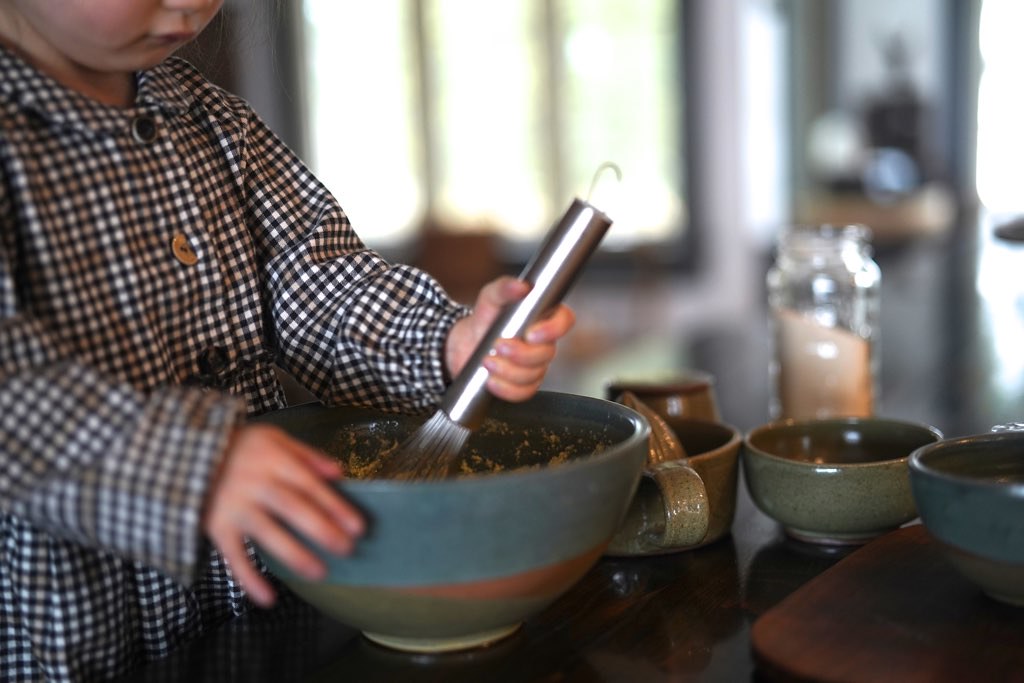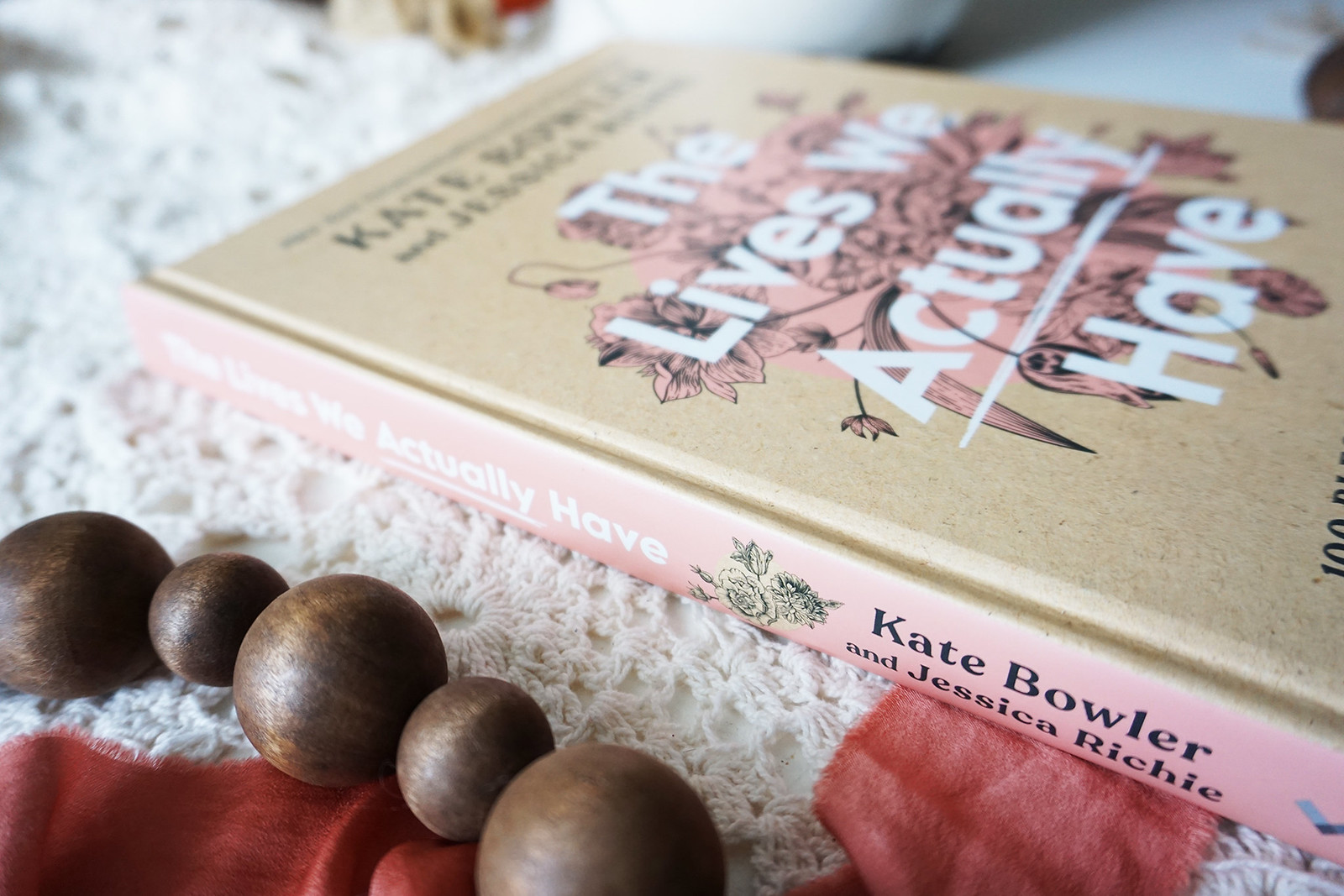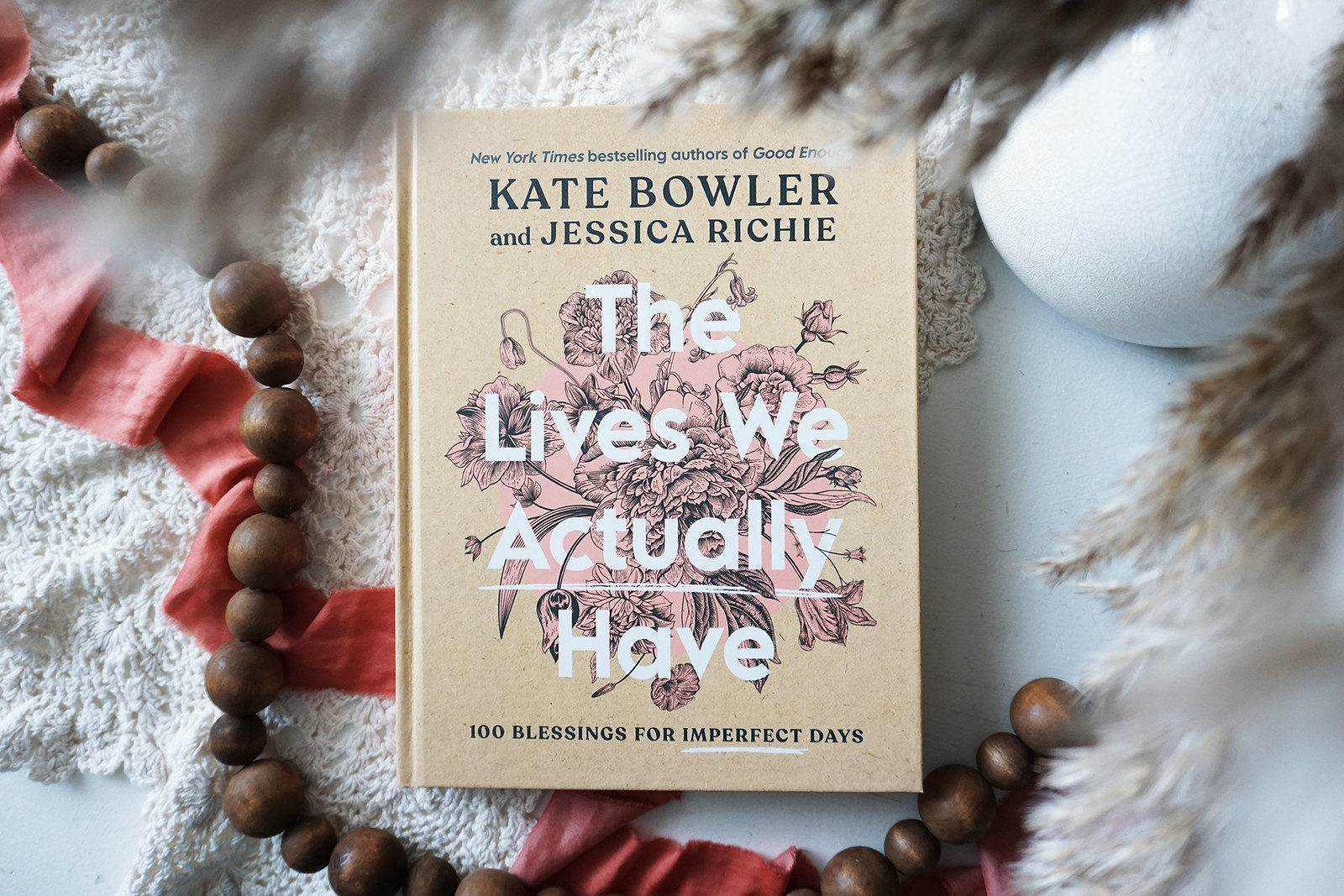We live in a world that demands relentless perfection. Happy marriages and easy friendships. Bucket list–level adventures and matching family photos. But what if our actual lives don’t feel very #blessed? Might our everyday existence be worthy of God’s blessing too? Kate Bowler and Jessica Richie’s new book of blessings, The Lives We Actually Have, offers a landing spot for weary souls, with blessings that focus on the full range of human moments: garbage days, lovely days, grief-stricken days, and even (especially) completely ordinary days. It is a wild (!!) grace to welcome Kate and Jessica to the farm’s table today.
“My prayers changed from relatively elaborate confessions of faith… into simple, raw hopes: God, save me, save me, save me. And, God, if you don’t, love me through.“
I turned to the language of blessing when I realized that I needed bigger categories to describe my own surreal experiences.
When I was thirty- five, I was diagnosed with Stage IV colon cancer. For the first few years, life was a crisis, a series of difficult, often life-or-death decisions that kept me and everyone who loved me in a state of perpetual fragility. As much as I am loath to say I “learned lessons”—I hate how suffering people are forced to say this—I did learn a great deal about my faith.
I came to understand more about the beauty of a God who accompanies you to the very edge.
My prayers changed from relatively elaborate confessions of faith (I am a professor in a divinity school, after all) into simple, raw hopes: God, save me, save me, save me. And, God, if you don’t, love me through.







But then?
Then what was supposed to be a crisis turned into days and weeks and months.
And I needed to learn the language of the God who appears occasionally on a Tuesday, but seems absent the rest of the week, yet who has something to teach me when I’m actually pretty busy running errands, thank you. I needed God to be a part of my mountaintop and valley moments, but whose love was recognizable to me the rest of the time too.
“But a blessing is more than a flush of gratitude for life’s great gifts. Or a spiritual language for triumph… the language of blessing is much wider and deeper.“
There is a beautiful and instructive language that we can use for naming that strange mix of awful and divine experiences in our lives. It’s the language of blessing.
American society is not a culture of blessing; it’s a culture of #blessed. (If you want a brief education in the pervasiveness of this phenomenon, search for #blessed on social media and come right back once you stuff your eyeballs back into their sockets. It is . . . a lot of information.)
Got that beach body by summer? #blessed.
Trip to Maui on the calendar? #blessed.
Is your family delightfully conflict-free and each child a scholarship recipient? Congratulations. You are #blessed and have thereby won social media.
Our society has taken a very precious truth about gratitude—that sometimes we feel so incredibly fortunate that we want to yell at the top of our lungs that God is good—and made ourselves the proof instead. We seem to be saying: Aren’t we actually pretty good too? Didn’t we happen to put ourselves at the right place at the right time doing the right things, to be so lucky?
But a blessing is more than a flush of gratitude for life’s great gifts. Or a spiritual language for triumph. According to Old Testament scholar Stephen Chapman, the language of blessing is much wider and deeper.
“Blessings put our spiritual house in order, even when our circumstances are entirely out of order.“
What is a blessing? Chapman begins by explaining that, in its most basic form, a blessing is a particular kind of spiritual act of speaking. But blessings are not simply expressions of thankfulness or affirmations of what God has done. We don’t have to simply say that we are blessed for what we have already received.
The act of blessing is the strange and vital work of noticing what is true about God and ourselves. And sometimes those truths are awful.
Like, blessed are those who mourn. I mean, Scripturally it’s true. Jesus said it. But does any of that feel true when our worlds are ripped to pieces? No.
Or, blessed are the poor. Again, it doesn’t feel true at all. But in the act of blessing the world as it is and as it should be, we are starting to reassemble what we know. Maybe, God, You are here in the midst of this grief. Maybe, God, You can provide for this specific problem or be discoverable when I’m buttering this toast.
For that reason, Dr. Chapman calls the act of blessing a kind of spiritual “placement.” This goes here. That goes there.
We are beginning to fit this moment into the larger order of things, the divine story of God’s work and purposes.
I find that language of placement and re-placement to be incredibly satisfying. Blessings put our spiritual house in order, even when our circumstances are entirely out of order.












When I bless the actual days I am living, I suddenly find I have a great deal more to say that is honest.
I am mourning. I am bored. I am exhausted. I am apathetic. I discover that I am freed from the need to declare everything #blessed. Good or bad, I don’t have to wait to say something spiritually true.
I can simply bless it all instead.
So bless you when you just need to put one foot in front of the other. Bless you when you need a little hope. Bless you on a garbage day or on a lovely day.
Bless you. Bless you. Bless you.
God is here with us, too. In our actual life. On whatever actual day we’re having. So here’s a blessing for this ordinary day:
Lord, here I am.
How strange it is, that some days feel like hurricanes
and others like glassy seas
and others like nothing much at all.
Today is a cosmic shrug.
My day planner says,
rather conveniently,
that I will not need You,
cry for you, reach for you.
Ordinarily, I might not think of You at all.
Except, if You don’t mind,
let me notice you.
Show up in the small necessities and everyday graces.
God, be bread.
Be water.
Be laundry.
Be the coffee cup in my hands
and the reason to calm down in traffic.
Be the gentler tone in my insistence today
that people pick up after themselves for once.
Be the reason I feel loved
when I catch my own reflection
or feel my own self-loathing
fluttering in my stomach.
Calm my mind,
lift my spirit,
make this ordinary day
my prayer of thanks.

Kate Bowler (a fellow Canadian), PhD is a New York Times bestselling author, podcast host, and a professor at Duke University. She studies the cultural stories we tell ourselves about success, suffering, and whether (or not) we’re capable of change.
At age 35, she was unexpectedly diagnosed with Stage IV cancer, causing her to think in different terms about the research and beliefs she had been studying. She penned the New York Times bestselling memoir, Everything Happens for a Reason (and Other Lies I’ve Loved), which tells the story of her struggle to understand the personal and intellectual dimensions of the American belief that all tragedies are tests of character.
Jessica Richie is a producer and writer. She serves as the executive director of the Everything Happens Initiative at Duke University and the executive producer of the Everything Happens podcast, which hosts wise, funny, and tender conversations between Dr. Kate Bowler and guests about lives that don’t always work out.
Kate and Jessica offer creative, faith-based blessings that center gratitude and hope while acknowledging our real, messy lives. Formatted like a prayer book, “The Lives We Actually Have”, is an oasis and a landing spot for weary souls, with blessings that focus on the full range of human moments: garbage days, lovely days, grief-stricken days, and even (especially) completely ordinary days. These heartfelt blessings are a chance to exhale when we feel everything from careworn to restless, devastated to bored. Let’s have a reminder that we don’t need to wait for perfect lives when we can bless the lives we actually have.
{Our humble thanks to Penguin Random House for their partnership in today’s devotion}







